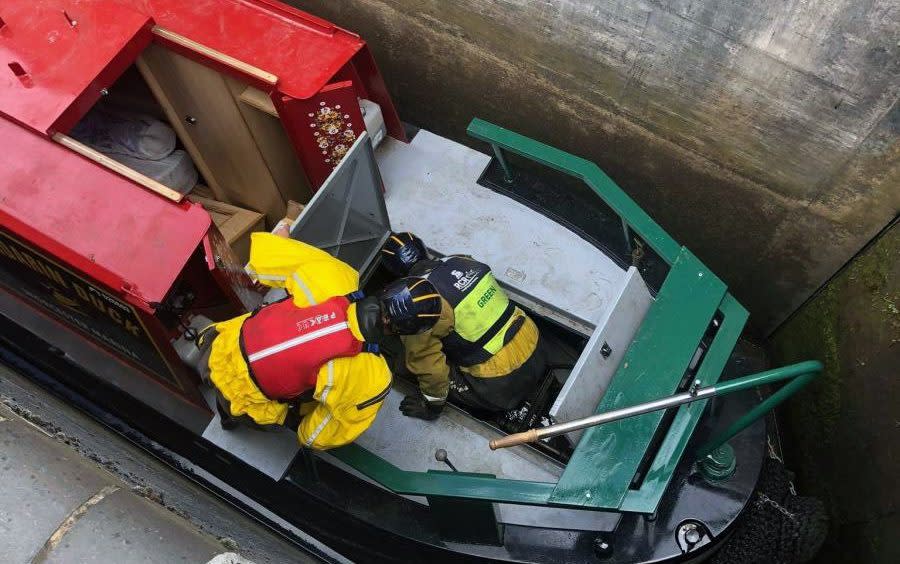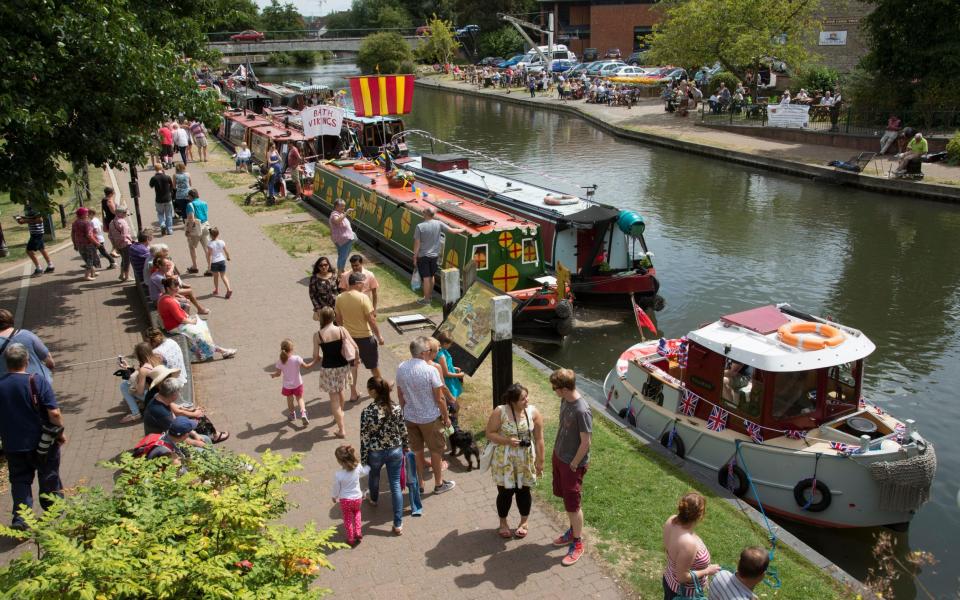Canal chaos: The party-goers causing havoc on British waterways

It was an entirely ordinary Friday night when narrowboat owner Amanda Huxtable, safely ensconced within her moored-up home, was shunted, suddenly and without warning, by another vessel on the Worcester Canal.
“I called the police because I was extremely frightened by the events,” she said after her boat was hit in the 10pm half-light by a hired narrowboat at Astwood Lane near Stoke Prior. The offending canal boat was, in fact, just one of three vessels that had been leased earlier in the day by a stag party.
But worse was to come. While reports were coming in of “racing” boats (narrowboats are restricted to 4mph on the canals) and other unsettling crashes with unsuspecting canal users, it soon came to light that the remaining two boats had met more ignominious ends. One had been entirely abandoned and the other, wedged into a Droitwich lock and as a result of poor lock handling, gradually sunk over Friday night.
The news of this stag-do gone terribly wrong quickly went viral, with pictures of the sunken hire boat whipping across the internet and bringing expressions of both joy and recriminations in equal measure. But with recent reports of the Huddersfield Narrow Canal being impassable due to submerged supermarket trollies, and Canal and River Trust (the charity that looks after and promotes England and Wales’s 2,000 miles of waterways) staff being issued with body cameras to monitor increasing levels of abuse, is the Worcester Canal catastrophe an unfortunate one-off, or is chaos starting to reign supreme on Britain’s picturesque, slow-paced inland waterways?
“In most walks of life, there are those who do things like you want them to and those who don’t – and it’s no different on the waterways,” reasons 78-year-old “live-aboarder” Beryl McDowall who is currently moored up on the River Soar. Beryl, who admits that she “lived in a house once”, continues: “But obviously the consequences can be quite serious. I see all sorts of things here. People travelling too fast when they’re approaching locks, too fast past moored boats. But a lot of it is done in ignorance: they just don’t know.”
Yet the information is freely available. The Canal and River Trust has published The Boater’s Handbook – a comprehensive 72-page booklet packed full of tips and terrifying case-studies of what could go wrong. The expectation is that users will be neighbourly, considerate and across all the various (and complicated) mechanics of operating locks, gears and a disarmingly powerful boat, it should be enough to keep any boating novice on their best behaviour.

However, while fines of the most punishing kind, not to mention jail sentences, are promptly delivered for being over the limit while operating other heavy machinery, pootling along the Grand Union while quietly steaming is, for some, an entirely reasonable proposition. Of course, residents and canal-based businesses don’t see it that way.
“There is a canal etiquette and there are a number of guidelines to follow and not drinking while you’re in charge of the boat is absolutely one of them – and we make sure all our customers are aware of that,” explains Corinne Newman, 38, co-owner of Chiltern Canal Boat Holidays. But she admits it’s not something that can be easily enforced. “It’s a difficult one to monitor once your customer is out and about. There is no canal police.”
Hold back, if you can, any visions of the fuzz tearing up the Norfolk Broads at 4mph and instead spare a thought for the people who are seasoned regulars on the canals, like Abbie Carr, 41, a fundraiser from Kingston-upon-Thames, whose recently refurbed narrowboat is a weekend getaway for her and her husband. “I think most people drive narrow boats a bit drunk, to be honest; it can be a bit like dodgems out there,” she says. “We watch out for the captain’s hats – spot one of those or a pirate outfit onboard and it’s a good indicator that someone is drunk at the wheel.”
And yet, while it’s easy to assume wayward waterway antics are a generational thing, there has been a definite shift towards younger people choosing to live on the water for monetary and lifestyle reasons. The (largely unwritten) code of canal etiquette is in fact understood, respected and adhered to by those calling the canals home.
“It’s hire boats – I think that’s where the main issue lies,” explains Luke Akerman, 24, who spent a year doing up his boat and currently has a mooring in a Manchester marina. “Hire companies are not giving enough training or telling people in strong enough terms that you have to abide by the rules.” Such “rules” include an unspoken evening curfew (“Generally, after 9pm you don’t travel. It’s a courtesy thing. Because people live and work on the boats and they don’t want to hear your engine”), not drinking at the wheel, and coming to the aid of any canal user if things start to go awry. (“The community here is incredible. Anyone will take time out of their day to help you.”) Clearly that memo didn’t reach the unfortunates hiring last weekend’s trio of doomed narrowboats.
“I personally have never hired a canal boat just because they are insanely expensive – during peak season, you’re paying well over £1,000 a week,” claims Akerman. “And, from my experience, generally the groups that hire them do go a bit crazy. Because as it’s not their car, but a boat, they think they can do what they want. That’s the feeling you get. ‘This is my holiday. I’ve earnt this, I’m paying a huge amount of money so I’ve got a free run.’ ”

The lack of any visible policing, save that of the self-regulating canal-goers’ code, also fuels novices’ confidence to behave in a cavalier manner, says Akerman. But, while he’s not advocating party mayhem on the waterways, the funny side of the recent Worcester debacle has not passed him by.
“The thing is,” he explains in a rolling chuckle, “with a canal boat, everything is in slow motion. So if you think you’re going to hit a boat or the side, you’ve got about 20 minutes to react. But people just panic. They think, ‘Oh no, I’m going to crash’ and then start doing erratic things. That’s when the problems usually occur.”
As McDowall dryly remarks on hearing the details of the Worcester stag party calamity: “You would have thought that they’d realise it was all going wrong – well before all that happened.”

 Yahoo News
Yahoo News 
